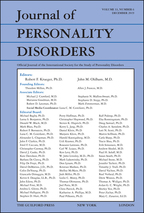Internal Processing in Patients with Pathological Narcissism or Narcissistic Personality Disorder: Implications for Alliance Building and Therapeutic Strategies
by Elsa Ronningstam, PhD
Abstract

Pathological narcissism (PN) and narcissistic personality disorder (NPD) have primarily been identified by striking external features, such as superiority, attention seeking and a critical or condescending attitude, and less attention has been paid to the internal processing contributing to this particular personality functioning. High dropout from treatment and challenges in building a therapeutic alliance with these patients call for further understanding of the complexity of disordered narcissism. Recent research on neuropsychological underpinnings to narcissistic pathology have provided valuable information that can inform therapeutic interventions for patients with this personality pathology. Internal processing in patients with PN or NPD is specifically influenced by compromised emotion processing and tolerance, identity diffusion, fluctuating sense of agency, reflective ability, perfectionism-related selfesteem, and ability to symbolize. The aim of this article is to review research studies with relevance for internal processing related to disordered narcissism and integrate findings with therapeutic strategies in alliance building with these patients.
Journal of Personality Disorders, 34 (Suppl): 80-103, 2020.
Link to Online Publication [can be requested from the library@bpsi.org]
This article is part of the Special Issue on Narcissistic Personality Disorder. Elsa Ronninstam, PhD, was the Invited Associate Editor for the issue, wrote an introduction (p. 1-5) and co-authored articles Perfectionism, Shame and Aggression in Depressive Patients with Narcissistic Personality Disorder (p. 25-41) and Dos and Don’ts in Treatments of Patients With Narcissistic Personality Disorder (p. 122-142).
About the Author
Elsa Ronningstam, PhD is an Associate Professor of Psychology at Harvard Medical School and a Clinical Psychologist at McLean Hospital in Belmont, Massachusetts. She is a member of the faculty at the Boston Psychoanalytic Society and Institute and a member of the Boston Suicide Study Group. She has published and presented extensively nationally and internationally on topics related to studies and treatment of suicide and personality disorders. Her earlier publications with the Boston Suicide Study Group include Psychotherapy with Suicidal Patients: The Integrative Psychodynamic Approach of the Boston Suicide Study Group (Medicina, 2019, 55, 303), Suicide and Self-Regulation in Narcissistic Personality Disorder (Psychodynamic Psychiatry, 2018, 46(4), 491-510), John Terry Maltsberger, American Psychoanalyst: Contributions to the Development of Studies of Suicide and Self-attack (Journal of the American Psychoanalytic Association, 2018, 66(5), 861–882), and Emerging Adults, Identity Development, and Suicidality: Implications for Psychoanalytic Psychotherapy (The Psychoanalytic Study of the Child, 2018, 71, 20-39).
Previous Posts:
Dan Jacobs (2019). Three’s a Crowd: Stella’s Pregnancy and the Arrival of an “Other” in A Streetcar Named Desire. International Journal of Applied Psychoanalytic Studies. 16:3, 174– 180.
Fred Busch (2020). The Clinical Significance and Problems of a Traumaticentric View. In Trauma and the Destructive-Transformative Struggle: Clinical Perspectives, edited by Terrence McBride and Maureen Murphy. Routledge, p. 187-194.
Jeremy P. Nahum (2019). Louis Sander: Remembrances and Reflections on His Contributions.
James M. Herzog (2019). “Polarity, Paradox and the Organizing Process in Development”; Parent-Infant Psychotherapy and Child Analytic Technique: In Honor of Louis Sander. Psychoanalytic Inquiry, 39:1, 98-108.
Lora Heims Tessman, PhD (2019). Momentums of Meeting. Psychoanalytic Inquiry, 39 (1): 88-97.
Jane Hanenberg, EdD (2019). Review of the book Demons in the Consulting Room: Echoes of Genocide, Slavery and Extreme Trauma in Psychoanalytic Practice ed. by Adrienne Harris, Margery Kalb, and Susan Klebanoff. American Imago 76(2), 274-278.
Paola M. Contreras, PsyD (2019). Working with the Human Trafficking Survivor: What Counselors, Psychologists, Social Workers and Medical Professionals Need to Know. In Working with the Human Trafficking Survivor: What Counselors, Psychologists, Social Workers and Medical Professionals Need to Know, edited by Mary C. Burke. Routledge, pp. 61-80.
Rodrigo Barahona, PsyaD (2019). Unlaid Ghosts: A Discussion Of Maria Grazia Oldoini’s “Abusive Relations and Traumatic Development: Marginal Notes on a Clinical Case”. Psychoanalytic Quarterly, 88:2, 277-295.
Sarah L. Lusk, PhD (2019). A Psychoanalytic Approach to the Complexity of Understanding and Treating Patients with ADHD Beyond Childhood: The Experiences of Two Psychoanalytic Candidates. The Psychoanalytic Study of the Child, 72:1, 61-70.
Anthony D. Bram, PhD, ABAP, FABP (2019). The Subjective Impact of Separation and Divorce on a Latency-Aged Child and His Analysis. Psychoanalytic Study of the Child, 72:24-32.
Anna Ornstein, MD (2019). Six Million and One: a documentary. In Cinematic Reflections on the Legacy of the Holocaust: Psychoanalytic Perspectives, edited by Diana Diamond and Bruce Sklarew. Routledge, p. 40-50.
Click here to see a full archive of featured papers. All articles can be requested from the library.

